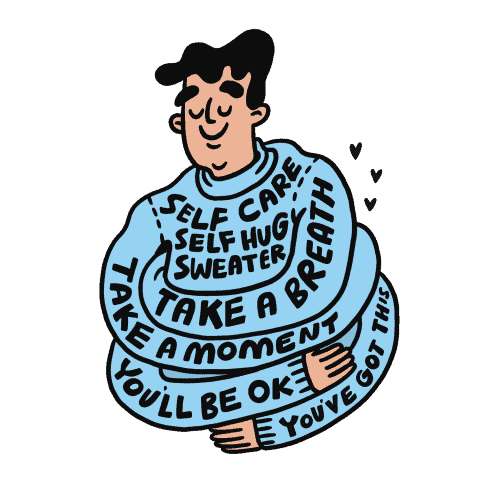Understanding the symptoms of stress and anxiety in our bodies is crucial in defining and personalizing self-care. To understand these symptoms, you’ll need to understand the systems that govern them — specifically, the sympathetic and parasympathetic nervous systems.
Together, these two systems control human internal body processes — like heart rate, breathing, digestion and metabolism, to name a few. This regulatory system, known as the autonomic nervous system, determines whether we will simply survive or if we will thrive.
Survival mode, often referred to as fight-or-flight, is controlled by our sympathetic nervous system. When the SNS is in charge, heart rate spikes, digestion slows, pupils dilate and adrenaline is released. This is the body’s way of preparing us for a potential threat. The problem is that our bodies can’t distinguish the difference between the stress of being chased by a bear and the stress of writing an exam.
In order to do its job properly, the brain needs our nervous system to calm down — this responsibility falls to the parasympathetic nervous system. The PNS lowers our blood pressure, promotes digestion and eliminates waste from our bodies. This is known as rest-and-digest mode. With more time resting and digesting, our brains can better learn to distinguish regular life stress from life-threatening stress.
So now that we know some of the sciency lingo, how do we define self-care? Bubble baths, dark chocolate and man caves are all well and good — but are they truly addressing the real issue? The Oxford Living Dictionary defines self-care as “the practice of taking action to preserve or improve one’s own health.” This would suggest that self-care is really more like health care.
Adding five minutes of mindful breathing to your daily routine is a small step with a big benefit. Dr. Andrew Weil, founder of the Arizona Centre for Integrative Medicine, suggests a simple breathing technique called 4-7-8. Sitting in a relaxed position with good posture, exhale completely and press your tongue to the roof of your mouth, just behind your top teeth.
Quietly inhale through your nose to the count of four. Hold that breath to the count of seven. With your tongue still pressed behind your upper teeth, exhale to the count of eight through your mouth, making a whooshing sound. Repeat the cycle again three more times, for a total of four breaths.
We are what we eat, literally. Fill your diet with more plant-based foods. Eat more colours and more spices, and add more variety. Eat less sugar — and yes, that means ease up on the booze. Eat less processed foods and add more fibre — trust me, healthy bowel movements are the ultimate self-care.
Hydration is key. Set alarms or schedule appointments on your calendar to remind yourself to drink water consistently throughout the day. Maintaining proper hydration is also helpful for health bowel movements and other bodily processes.
Getting enough sleep is also essential for your health. Finding a way to establish a consistent sleep-wake schedule, in spite of the excitement and demanding expectations of university, will assist your brain and nervous system in the critical rest-and-digest process.
Get connected. Connect to something bigger than yourself. Maybe it’s spirituality or nature or volunteer work. Loneliness is a form of stress — a threat — and that doesn’t just mean being alone. Loneliness is disconnectedness. Connect to a purpose. What is your why? Maybe your fire feels more like a small candle right now, but something is still lighting it — connect to that something.
Surround yourself with people that empower you, inspire you, encourage you and hold you accountable. Connect to those people who get you — who accept you, support you and make you laugh. Creating community and connecting to purpose is vital in order to not merely survive but to thrive.
—
Shiloh Naomi
Graphic: Jaymie Stachyruk / Graphics Editor
Leave a Reply